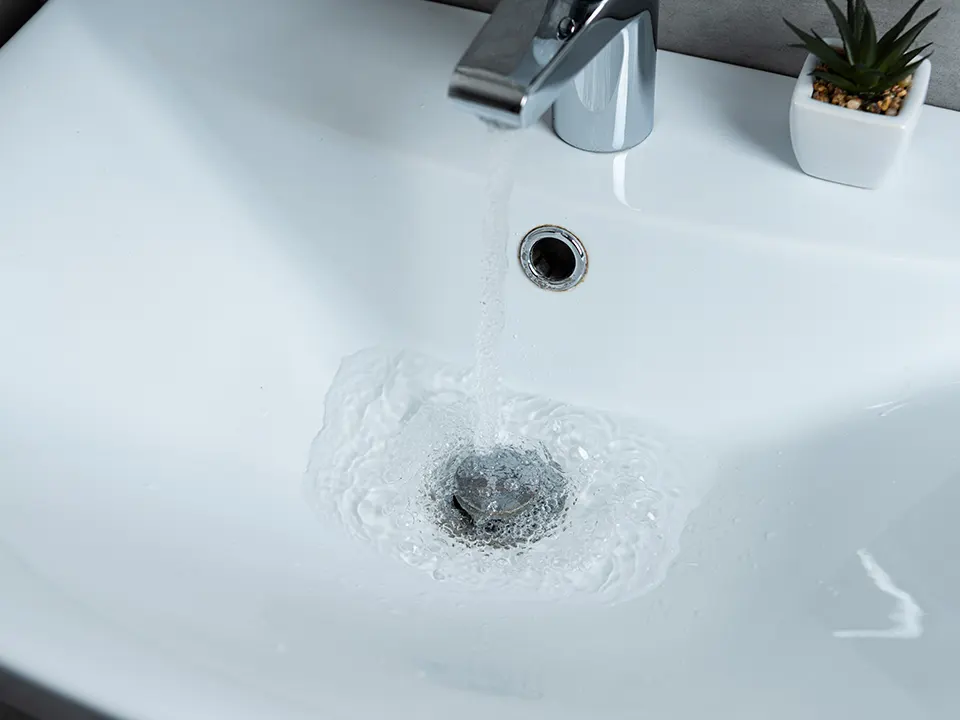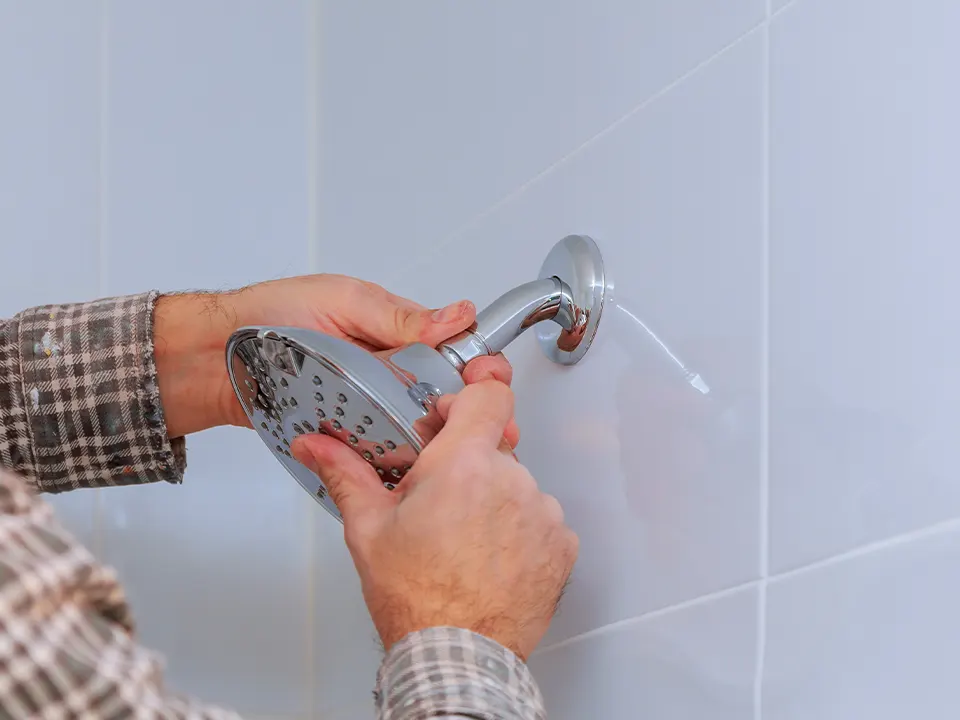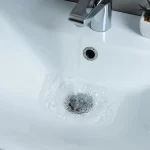
How to Fix a Slow Draining Sink: Quick Solutions for Common Problems
January 22, 2025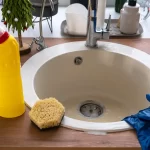
Is it Safe to Use Chemical Drain Cleaners?
February 21, 2025Hard water stains are a common headache for many homeowners. You’ve probably noticed those unsightly, cloudy marks on your faucets, showerheads, and fixtures that seem impossible to remove. But don’t worry—getting rid of hard water stains is easier than you think. With the right tools and techniques, you can have your fixtures sparkling again in no time.
In this blog, we’ll examine what hard water stains are, how to get rid of them, and how to prevent them from coming back.
What Causes Hard Water Stains on Faucets and Fixtures?
Hard water stains are the result of minerals, mainly calcium and magnesium, found in your water. When the water evaporates from your faucets or showerheads, these minerals are left behind, leaving stubborn spots and streaks.
Areas with high mineral deposits in the water are more prone to these stains, especially in places like bathrooms and kitchens. The spots can be hard to notice at first, but over time, they build up and become more visible, making your fixtures look dirty and dull.
You can usually tell if you have hard water if you notice these stains consistently around your sinks, faucets, or showerheads. To confirm, you can even do a simple test at home by filling a clear bottle with water, shaking it, and letting it settle. If you see cloudy particles or sediment in the bottle, you most likely have hard water.
Quick Checklist: What You’ll Need to Remove Hard Water Stains
Before you scrub the stains away, it’s important to gather the right supplies. Here’s what you’ll need:
-
- Vinegar: Distilled White vinegar is a go-to solution for cleaning hard water stains. Its acidity helps break down the mineral build-up.
- Baking Soda: This simple ingredient is perfect for making a paste that gently scrubs away stains without scratching your fixtures.
- Lemon Juice: A natural acid, lemon juice works similarly to vinegar and leaves a pleasant scent behind.
- Commercial Cleaners: For more stubborn stains, you might want to use a specialized cleaner made for hard water stains.
- Non-abrasive Scrubbers: A soft sponge or microfiber cloth will prevent scratching the surface of your fixtures.
- Rubber Gloves: If you use stronger cleaners, gloves can protect your hands from irritation.
Step-by-Step: How to Remove HardWater Stains Naturally Vinegar Method
Vinegar is one of the most effective (and affordable) ways to remove hard water stains. Its acidity helps dissolve the mineral build-up, leaving your fixtures clean and shiny. Here’s how to use it:
- Soak a cloth or paper towel in white vinegar.
- Wrap the soaked cloth around the stained area.
- Let it sit for about 15–30 minutes. For tougher stains, you can leave it for up to an hour.
- After the waiting period, gently scrub the area with a soft sponge or cloth.
- Rinse thoroughly with warm water and dry with a microfiber cloth.
This method works well for faucets, showerheads, and other fixtures. If the stains are particularly stubborn, repeat the process or try the next method.
Baking Soda Paste
Baking soda is a gentle abrasive that works amazingly when combined with vinegar or water. You can make a paste to scrub away stains without damaging your fixtures.
- Mix about 3 parts baking soda to 1 part water to create a thick paste.
- Apply the paste to the stained area.
- Let it sit for 10–15 minutes to allow the paste to penetrate the stain.
- Use a cloth or sponge to scrub the paste in small, circular motions.
- Rinse and wipe the area clean with warm water.
This method is excellent for removing stains on chrome or stainless steel fixtures, as it doesn’t scratch the surface.
Lemon Juice
Lemon juice is another natural option for removing hard water stains. It’s particularly good for smaller stains and adds a fresh scent to your fixtures. Here’s how to use it:
- Cut a lemon in half.
- Rub the cut side of the lemon directly onto the stained areas.
- Let the lemon juice sit for 10–15 minutes.
- Scrub gently with a soft sponge or cloth.
- Rinse thoroughly and dry with a microfiber cloth.
Lemon juice is also great for polishing faucets and leaving them looking brand new.
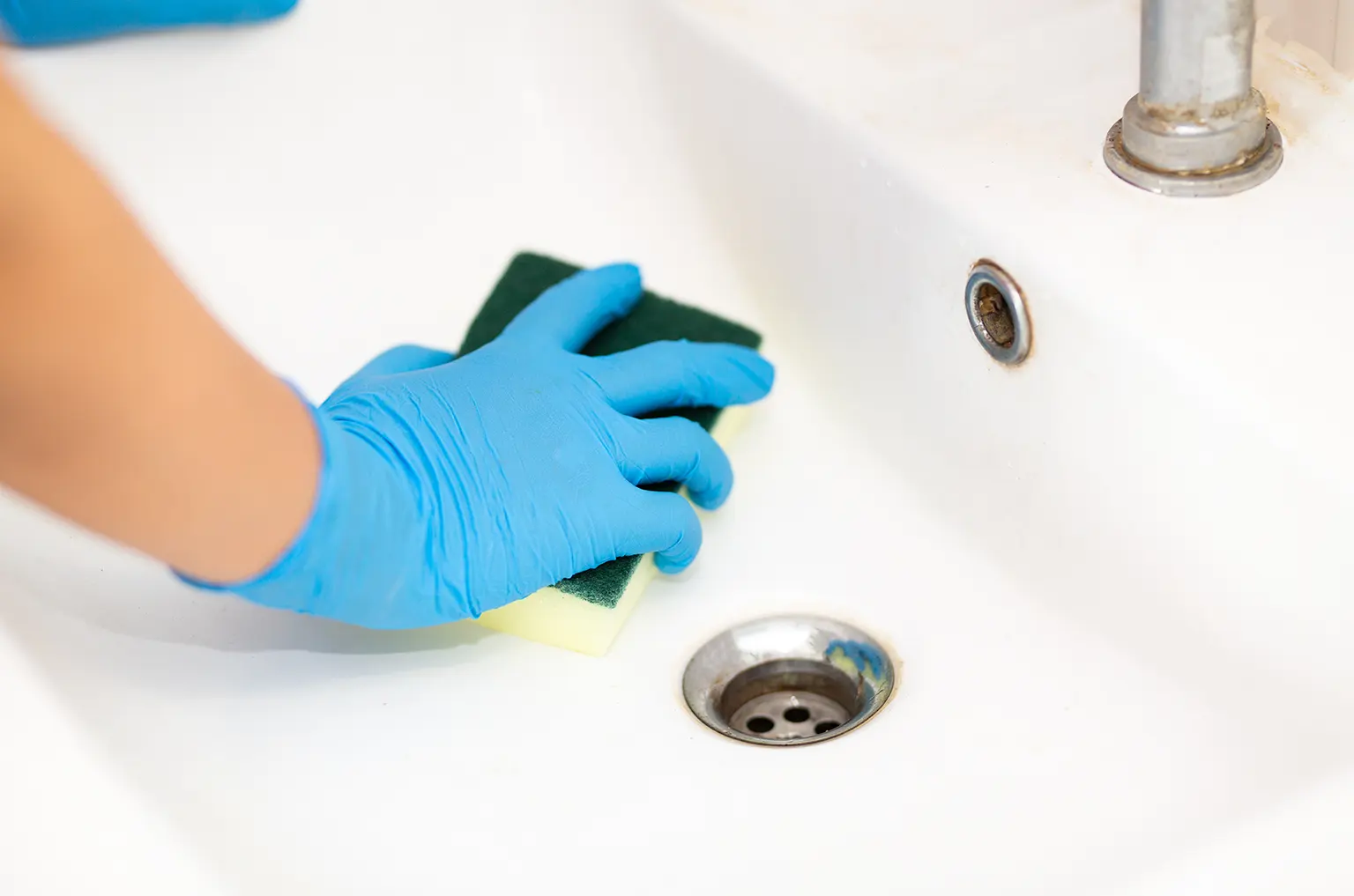
Using Commercial Products for Stubborn Stains
If natural methods aren’t cutting it, commercial products specifically designed for hard water stains might be your best bet. There are plenty of cleaners on the market that target mineral build-up, and many are formulated to be tough on stains but gentle on your fixtures.
When choosing a commercial cleaner, look for one that’s labelled safe for your type of fixture, whether it’s chrome, stainless steel, or brass. Be sure to follow the manufacturer’s instructions for the best results. Here’s how to use them:
- Apply the cleaner directly to the area that is stained or onto a cloth.
- Let it sit for the recommended time, usually 10–15 minutes.
- Scrub with a soft cloth or sponge.
- Rinse thoroughly with warm water.
Many commercial cleaners contain acidic ingredients, so be sure to wear rubber gloves and avoid contact with your skin or eyes.
Preventing Hard Water Stains: Practical Tips
Now that you’ve removed the hard water stains, let’s focus on preventing them from coming back. While it’s impossible to completely eliminate hard water, there are a few tricks you can use to minimize the stains:
- Wipe Fixtures Dry After Use: After you’re done washing your hands or using the shower, give your faucets a quick wipe with a towel. This will help remove excess water before it evaporates, leaving fewer minerals behind.
- Install a Water Softener or Filter: If your area has hard water, installing a water softener or filter is a long-term solution to reduce the amount of minerals in your water. These systems can be installed on a whole-house level or for specific fixtures like showers.
- Use Preventative Coatings: Some products create a protective barrier on your fixtures, preventing hard water stains from forming. You can find these in home improvement stores, and they’re great for keeping your fixtures cleaner for longer.
For those living in rental properties or who can’t make major changes, using a water softener attachment for your showerhead can be an affordable option.
Care for Different Fixture Materials
Different materials require different care to avoid damage while cleaning. Here’s a quick guide for common fixtures:
- Chrome Fixtures: These are prone to scratches, so always use non-abrasive scrubbers. Avoid using harsh chemicals that could dull the finish.
- Stainless Steel: To maintain its shine, use mild cleaners and always dry the surface after cleaning to avoid water spots.
- Bronze and Brass: These finishes require non-corrosive cleaners and should be wiped down with a soft cloth to avoid discoloration.
Keep Your Faucets and Fixtures Spotless
Hard water stains don’t have to be a permanent fixture in your bathroom or kitchen. With a few simple steps, you can remove stains naturally or with the help of commercial cleaners. Regular maintenance and a few preventative measures will keep your faucets and fixtures looking new.
For more tips or assistance with your plumbing needs, feel free to reach out to us—we’re here to help with everything from hard water solutions to full plumbing services.



